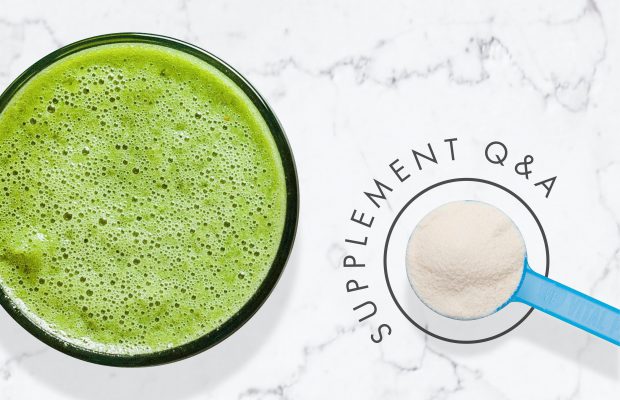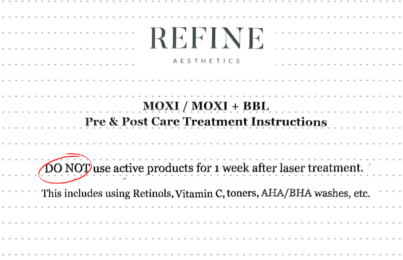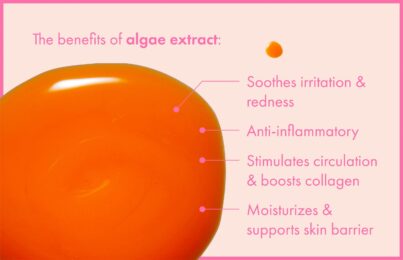Updated 02/15/22. As the line between skincare and wellness continues to blur, many people are turning to supplements in the hopes of improving their skin from the inside out. Collagen supplements are probably the most common, although niacinamide, zinc, and even hyaluronic acid supplements have also proven to be popular. More recently, chlorophyll became the go-to, after it exploded in popularity on Tik Tok due to claims it could alleviate certain skin issues (more on that, later).
In this post, I’ll talk about the effect supplements can have on the skin. I’ll also discuss common ingredients in skincare supplements, determining which ones can be effective when taken orally and which ones are better left to topical application. Keep reading for all of this and more!
Can Skincare Supplements Really Improve My Skin from the Inside-out?
My answer to this question is, “it’s complicated.” While some supplements can possibly offer skin benefits, it’s well-established that ingesting specific compounds is not the most effective way to protect, maintain, and improve skin health. It’s important to understand that once something is ingested, it must make it through the gastrointestinal tract, cross the intestines to enter the bloodstream and circulate through the body to reach the skin. It’s unlikely that specific ingredients head right to the skin, depositing there versus depositing equally throughout the body. However, topical skincare ingredients are applied directly to the skin, targeting it directly.
There are mixed thoughts on skincare supplementation in the scientific community. Studies have certainly been conducted, but most of them are in vitro or animal studies, which means they can’t necessarily be extrapolated to humans. The studies that have been conducted on humans are either inconsistent or offer mixed results. It’s also worth noting that most modern-day diets are diverse and nutritious, which means the average person gets all the vitamins and minerals they need from their diet alone. Deficiencies, while not unheard of, are uncommon.
Can Skincare Supplements Cause Any Adverse Effects?
It’s possible that certain supplements could cause increased sensitivity or alter the condition of the skin. This means that it could affect the way your skin reacts to a topical skincare product. It’s important to disclose any supplements you’re taking, along with dose and frequency, to your doctor to ensure there are no potential adverse effects or reactions that could result.
What Are Some Common Skincare Supplements and Are They Effective?
Here are some of the most common ingredients used in skincare supplements.
Collagen
Let’s kick things off with collagen, which is perhaps the most popular type of skincare supplement on the market. Collagen is a protein that’s integral to the structure of the skin and keeps it looking firm and tight. It degrades as we age, and our bodies lose the ability to rebuild it, which leaves us looking for a way to restore it. That’s where collagen supplements come in. People take them in either powder, liquid, or capsule form due to claims that they can improve firmness, reduce the appearance of wrinkles, and even maintain skin hydration.
There have been studies conducted to investigate the impact of collagen supplements on the skin, and some of them demonstrated positive results. For instance, one study looked at skin vulnerability in an older adult population. Adults were supplemented with 10 grams of collagen per day. After eight weeks, there was a significant, measurable improvement in skin hydration and elasticity. In another study, Japanese women were treated with 10 grams of collagen per day for 56 days. They reported a measurable increase in skin moisture.
While there are studies with promising results, there is much more research needed to truly understand the benefit of collagen supplements, especially when it comes to the reduction of wrinkles (which is a major reason people take collagen supplements). Because there are so many different types of collagen, and varying demographics between populations that have been studied, it’s difficult to say whether or not collagen supplements can really benefit the skin like so many of them claim they can.
One sure-fire way to build and protect collagen is through the topical application of peptides. These are chains of amino acids that act as the building blocks of proteins (including collagen). You can find peptides in the Firm + Repair Overnight Serum.
Biotin
Biotin, or vitamin B7, is responsible for the formation of fatty acids and glucose in the body. While we’re not able to directly see the benefits of consuming biotin, we can see when we’re deficient. Biotin deficiency results in things like hair loss, rashes, and even hearing and vision problems. It can be serious, but it’s rare. Most people can get enough biotin from their diets.
In fact, the average adequate intake of biotin for an adult is 30 micrograms per day. One boiled egg has eight micrograms of biotin. One serving of salmon has five micrograms of biotin. Because it’s found in foods like milk, cheddar cheese, broccoli, bananas, and sweet potatoes, it’s unlikely you’re actually deficient in it. Indeed, if you’re not deficient, and you take a supplement anyway, your body will most likely excrete it.
At the end of the day, I don’t recommend taking a biotin supplement unless you’re deficient in it. If you think that’s the case, consult a doctor. There’s simply not enough evidence to support it can have any kind of visible effect on the skin.
Chlorophyll
Chlorophyll is a super buzzy skin supplement, thanks to its recent popularity on social media. People claim drinking liquid chlorophyll can address certain skin concerns such as redness, hyperpigmentation, and acne. The truth is, there’s little to no scientific evidence to prove that.
Unlike collagen and biotin, chlorophyll doesn’t exist naturally in our bodies. When we ingest a chlorophyll supplement, it’s really providing an antioxidant function (antioxidants are important in fighting free radicals, which are involved in aging our skin and causing cellular damage). One study found that two doses of chlorophyll per day for 90 days showed an improvement in facial wrinkles and skin elasticity in participants. That’s promising, but more information is needed—especially when it comes to claims of addressing redness, hyperpigmentation, and breakouts.
With that being said, taking a chlorophyll supplement probably won’t hurt. Although, you could simply eat leafy greens, such as spinach, kale, and broccoli to reap the antioxidant benefits! All of those foods are high in chlorophyll content.
Niacinamide
Niacinamide, or vitamin B3, is a skincare superstar. It’s known for improving skin barrier function, soothing redness, lessening the appearance of hyperpigmentation, and even addressing breakouts. This ingredient is critical to cellular function and helps make antioxidants that are needed in cells throughout the body. However, oral supplementation probably isn’t the most effective way to reap these skin benefits. Again, this is because, in order to reach the skin, it must make its way through the digestive tract, into the bloodstream, and circulate throughout the body. Seeing as every cell in the body uses this vitamin, it’s unlikely it’s getting to the skin in a significant amount. Although a supplement probably couldn’t hurt, it’s best to stick to topical application for skin benefits. Read more about the benefits of using niacinamide in topical skincare products.
Vitamin A
Vitamin A supplements have been around since the 1950s, and there is research out there that points to their efficacy. One study investigated oral vitamin A supplementation in people with so-called normal skin. It was determined that supplementing with vitamin A increased vitamin A levels in both the blood and the skin. In other words, it showed that vitamin A supplements can actually reach the skin. Despite this, I personally think that vitamin A and vitamin A derivatives (retinol and retinoids) are best when applied topically. They can help improve the skin’s appearance through cellular turnover. Just be sure to read my beginner’s guide to retinol to ensure the best experience.
Vitamin C
Vitamin C is one of the most essential vitamins for the maintenance of connective tissue and skin. It plays an important role in wound healing, is tolerated in high doses, and is present in many, if not all, cells in the body. When it comes to the skin, it can provide brightening effects and antioxidant benefits.
I personally take a vitamin C supplement with bioflavonoids daily. However, I take it for internal antioxidant and immune support—not necessarily for skin benefits. The reason I take one with bioflavonoids is that they’re thought to strengthen capillaries, which can help prevent broken blood vessels. I still think the topical application of vitamin C is the best way to get this ingredient’s brightening and antioxidant benefits delivered to the skin since oral supplementation will deliver it equally around the body.
One benefit of vitamin C supplementation is the potential for a photoprotective effect (protection from UV light). One study demonstrated this by supplementing participants with 500 milligrams of vitamin C per day for eight weeks. With vitamin C alone, they didn’t see a photoprotective effect. However, when they tested it in combination with vitamin E, and then vitamin E and carotenoids (an antioxidant), it helped improve photoprotection of the skin, reduce DNA damage, and skin burning. The synergistic effect between vitamin C and E isn’t surprising. After all, vitamin E helps stabilize vitamin C and provides extra free radical protection. That’s why I formulated with Vitamin C & E Treatment with both ingredients.
Hyaluronic Acid
I believe hyaluronic acid is best for topical use. While there is some research on the skin benefits of hyaluronic acid supplements, it’s not the most reliable. Researchers reviewed the effects of a specific oral hyaluronic acid supplement in a group of 20 subjects. They took the supplement daily for 40 days. While they reported results such as improved skin thickness and moisture content, they tested a specific blend that also contained ingredients like vitamin C, biotin, and zinc, which also play a role in skin health. They admitted more research needs to be done to correlate hyaluronic acid supplementation and skin benefits. I say stick to topical application of hyaluronic acid, or its more stable, bioactive salt form, called sodium hyaluronate.
Zinc
This ingredient offers a multitude of benefits for the skin, and it has a lot of demonstrated therapeutic effects when used orally and topically. Zinc contributes to the normal maintenance of skin health, as it’s involved in repair and anti-inflammatory processes. It has even been demonstrated to have a positive effect on breakouts, dandruff, and dermatitis. If you’re interested in taking a zinc supplement, it may, in fact, provide skin benefits. However, consult a doctor before you do so, as overdoing it could lead to neurotoxicity (yikes!).
Antioxidants
A lot of compounds can function as antioxidants, including the aforementioned chlorophyll, niacinamide, vitamin A, and vitamin C. It’s well understood that consuming antioxidants increases the number of antioxidants in the bloodstream, so, yes, eating a diet rich in antioxidants is important! Take it from Registered Dietician Nutritionist, Keri Gans, who says, “a diet rich in antioxidants, which have anti-inflammatory benefits, may help reduce fine lines and wrinkles by reducing oxidative stress in our body.” However, whether it’s carotenoids, lycopene, anthocyanins, or any other type of antioxidant, they don’t head straight for the skin. Instead, they circulate in the bloodstream, going to all cells in the body.
While antioxidants are present in the skin, we don’t know how many can get there through supplementation. Plus, since there are so many types of antioxidants, and the word itself covers such a wide variety of compounds, it’s a pretty broad statement to say that we should all be supplementing with antioxidants. That’s why I suggest a mixed approach to antioxidants—both consuming them and applying them topically.
What’s the Bottom Line?
Different skin supplements can affect the body (and the skin) differently. As a whole, the research isn’t super solid to back up a lot of the claims that brands, and their supplements, have made. However, I’m of the mindset that it doesn’t hurt (that’s why I sometimes recommend certain supplements for people with acne-prone skin). After all, if there’s a chance that a supplement can play a supporting role in accomplishing whatever your skincare goals are, then why not take them? Just be sure to consult with your doctor before doing so.
To me, skincare supplements are no different than the food you eat in that they might help the greater good (meaning your overall health and wellness), but they’re not going to make a dramatic difference in the appearance of your skin. Eating broccoli won’t give you an instant glow and neither will ingesting a supplement. As always, an effective skincare routine built around your specific skin type is your best bet.
Next, read up on how to care for your skin when working out.
Celebrity Esthetician & Skincare Expert
As an esthetician trained in cosmetic chemistry, Renée Rouleau has spent 35 years researching skin, educating her audience, and building an award-winning line of products. Her hands-on experience as an esthetician and trusted skin care expert has created a real-world solution — products that are formulated for nine different types of skin so your face will get exactly what it needs to look and feel its best. Trusted by celebrities, editors, bloggers, and skincare obsessives around the globe, her vast real-world knowledge and constant research are why Marie Claire calls her “the most passionate skin practitioner we know.”




Comments:
What about hair?
Anything that can help eyebrows?
Posted By: Mary Cellucci |
Thank you for your comment! Since hair and skin grow and thrive differently I would suggest talking to your doctor or dermatologist.
Posted By: Renée Rouleau |